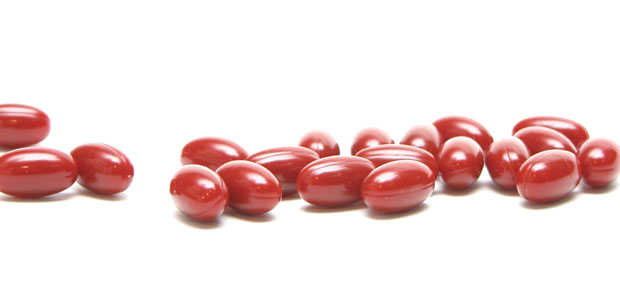Advertisement
Spotlight on Coenzyme Q10
Coenzyme Q10 (CoQ10), also known as ubiquinone, is an essential component of the energy-producing unit of our cells, the mitochondria. Its role in the mitochondria is similar to the role of a spark plug in a car engine; just as the car cannot function without that initial spark, the mitochondria cannot produce energy without CoQ10. … Continued

Coenzyme Q10 (CoQ10), also known as ubiquinone, is an essential component of the energy-producing unit of our cells, the mitochondria. Its role in the mitochondria is similar to the role of a spark plug in a car engine; just as the car cannot function without that initial spark, the mitochondria cannot produce energy without CoQ10.
Although the body makes some of its own CoQ10, research shows significant benefits with supplementation. The elderly may have increased CoQ10 requirements as CoQ10 levels decline with age. The therapeutic uses of CoQ10 are based upon its ability to improve energy production and act as an antioxidant.
Fighting Heart Disease
CoQ10 deficiency is common in people with heart diseases of any kind. Clinical studies demonstrate that correcting a CoQ10 deficiency can produce significant improvements.
Angina describes a squeezing or pressure-like pain in the chest. Angina is caused by an insufficient supply of oxygen to the heart muscle. CoQ10 has been shown to be effective in several small studies in angina patients.
Cardiomyopathy refers to any disease of the heart muscle that causes a reduction in the force of heart contraction and a resultant decrease in the efficiency of blood circulation. Cardiomyopathy may be the result of viral, metabolic, nutritional, toxic, autoimmune, degenerative, genetic, or unknown causes. Regardless of the cause, a deficiency of CoQ10 has been found in the blood and myocardial tissue of most patients with cardiomyopathy. CoQ10 supplementation can raise CoQ10 levels and produce improvements in heart function. In patients with cardiomyopathy given CoQ10, the amount of blood pumped by each contraction of the heart (the mean ejection fraction) increased from about 25 percent to about 40 percent. The two-year survival rate was 62 percent compared to less than 25 percent for a similar series of patients treated by conventional drug therapy alone. Individuals with cardiomyopathy will need to be on CoQ10 indefinitely to maintain any real benefit.
Congestive heart failure (CHF) refers to an inability of the heart to effectively pump blood. CHF is most often due to long-term effects of high blood pressure, disorder of a heart valve, or a cardiomyopathy. Studies have shown CoQ10 supplementation to be effective in the treatment of CHF. Most of these studies utilized CoQ10 along with conventional drug therapy. These studies suggest that CoQ10 is helpful in mild CHF when used as a sole therapy and can effectively reduce hospitalization and serious consequences when used along with conventional drug therapy in moderate to severe CHF.
High blood pressure (hypertension) is accompanied by CoQ10 deficiency in about 40 percent of patients with hypertension. In several studies CoQ10 was shown to lower blood pressure after four to 12 weeks of therapy. Typical reductions in both systolic and diastolic blood pressure with CoQ10 therapy in patients with high blood pressure are in the 10 percent range.
CoQ10 is also being studied for its potential benefits as a therapy in other conditions, including cancer, diabetes, muscular dystrophy, periodontal disease, and weight loss.
Prevention of Possible Side Effects From Drugs:
Coenzyme Q10 is generally well-tolerated, and no significant side effects have been reported with either short- or long-term use. Many drugs adversely affect CoQ10 levels in the body, however. CoQ10 can also mitigate the side effects of some drugs.
Experts recommend supplementing CoQ10 at dosages ranging from 30 to 100 mg per day to prevent side effects or the depletion of CoQ10 for people taking the following classes of drugs:
- chemotherapy drugs such as adriamycin (doxorubicin hydrochloride)
- cholesterol-lowering drugs
- beta blocker drugs used in angina, high blood pressure, and heart arrhythmias
- phenothiazine drugs used in various psychiatric disorders
- tricyclic antidepressants.
Available Forms and Dosage:
Coenzyme Q10 is available primarily in tablet or capsules. Based on bioavailability studies, the best preparations are soft-gelatin capsules containing CoQ10 and rice bran oil. Taking any CoQ10 preparation with meals greatly increases its absorption.
The usual dosage of CoQ10 is 50 to 150 mg per day. Although most studies used a dosage of 100 mg per day, larger doses (up to 300 mg per day) may be needed in cases of severe heart disease. Perhaps a more accurate dosage recommendation is based upon the person’s weight. Some of the studies used a dosage of two mg CoQ10 for each kilogram (2.2 pounds) body weight.




